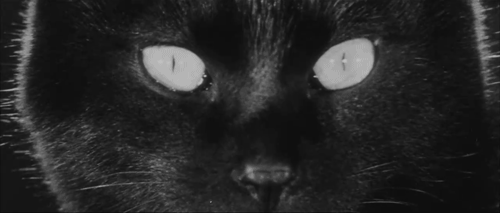by Lisa Morton
Allow me a moment to sing the praises of The Criterion Collection. Their magnificent DVDs have introduced me to a number of films I would have missed otherwise, especially those intriguing gems from other countries that may have been difficult to see in the U.S. Take their Japanese horror releases, for instance - aside from more well-known classics like UGETSU and KWAIDAN, they've also got JIGOKU (already reviewed in this column), the completely lunatic HOUSE (review coming soon), and the subject of of this installment, KURONEKO. I'd never heard of KURONEKO until I found it in the Criterion catalog, and now I'm glad I did.
KURONEKO may not have the artfulness of UGETSU, the frantic pace of HOUSE, or the trapped-in-a-bad-dream feel of JIGOKU, but what it does have is a very solid script, buoyed by fine performances, lovely cinematography, memorable music, and plenty of genuinely creepy moments. It begins in Japan's past, as two women alone in a farmhouse are found by a band of bad-guy samurai soldiers who eat their food, rape the women, and then set fire to the house. As the sated warriors wander off, the dead or dying women are attended by their black cat...
Flash forward to: Several years later, when the women have come back as the vengeful ghosts with more than a hint of feline about them. They have a singular, specific purpose: To wreak revenge on all samurais. They do this by luring lone soldiers to an isolated house, where the older woman (mother) attends them, while the lovely younger one seduces them - before biting their throats out. They tell one of their victims that they are still awaiting the return of GIntoki, son and husband to mother and daughter-in-law.
When enough of his men are discovered dead, the arrogant local lord orders an investigation, and calls for his bravest soldier to investigate. Because, of course, KURONEKO is based on a traditional legend, coincidences and deus ex machina-twists of fate are not just accepted but expected; in this case, the plot hinges on the fact that the cruel lord assigns none other than Gintoki, only recently returned from war and now a hero, to pursue the murderous ghosts.
That's roughly the halfway point of KURONEKO; the rest of the film is occasionally poignant (as Gintoki engages in a ghostly affair), erotic (see above), and fantastic (as the cat spirits within the ghosts emerge).
What's surprising about KURONEKO is that it's more obvious about its genre elements than something like, say, UGETSU. There are glimpses of catwomen, murdered soldiers, and even a severed half-paw/half-hand (although it lacks the obvious gore of the earlier JIGOKU). It's also interesting that director Kaneto Shindo shot his 1968 film in black and white, when most other Japanese films had moved to color. The black and white ends up serving the story very well; Shindo is skilled at creating high-contrast compositions, and some of the most startling moments in the film are when white figures are glimpsed gliding through a black frame behind an unwitting soldier.
Will KURONEKO be frightening to modern audiences? Well, I'm not sure it was frightening to 1968 Japanese audiences, because Shindo is going for a moodier piece, and at that KURONEKO is completely successful. It's got that unsettling feel of an authentic, unprocessed fairy tale, like a Grimm's before Disney gets a hold of it.
The performance of Nobuko Otowa as catwoman mom also lends significantly to the film's aura. She glides along hallways with animal grace, laps at water, and performs kabuki-like movements as her daughter-in-law tempts and destroys each new samurai. She delivers the film's most tragic and strange speeches, and is also fine as the ultimate, fiendish antagonist GIntoki must face.
Of course the Criterion transfer is exquisite, and I highly recommend their disc of KURONEKO to those looking to expand their knowledge of Asian horror cinema. It certainly expanded mine.
--Lisa Morton




